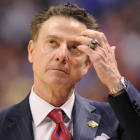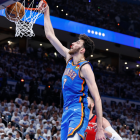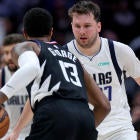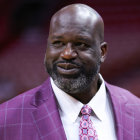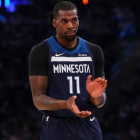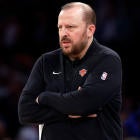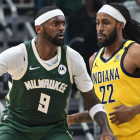After the 2001-02 season, the original Charlotte Hornets were looking to move. As we know now, they eventually relocated to New Orleans, becoming, at least for the time being, the New Orleans Hornets. What we didn't know, until a recent report, is that the team nearly moved to Louisville instead.
In a deep-dive into the scandal surrounding the University of Louisville's basketball program, Bloomberg reported that the Hornets had a non-binding agreement with the city burghers to relocate to Louisville, a move that would have come with a new arena.
Of course, that didn't end up happening, and it was because of the efforts of Rick Pitino and Tom Jurich. Louisville's then-head coach and then-athletic director worked together to block the move, because they didn't want to share an arena with an NBA team. Via Bloomberg:
Around the time Pitino arrived, a group of Louisville businessmen and politicians were making a concerted effort to land an NBA team. In part, this was a play for economic development. Louisville could see how pro football and hockey helped revitalize Nashville. But it also came just as much from a desire for respect. The city burghers even had a nonbinding agreement with the Charlotte Hornets, which wanted to relocate. The plan centered around building a downtown arena that the Hornets and the Cardinals would share.
Jurich and Pitino had other ideas. They had no intention of sharing an arena with an NBA team—they didn't even want to share the city with an NBA team. Louisville was theirs. David Stern, who was then commissioner of the NBA, recalls thinking, "If Rick Pitino doesn't want us there, why are we going there?" The Hornets went to New Orleans instead.
A basketball hotbed, Louisville is often one of the first cities mentioned when expansion is mentioned in the NBA. Until now, however, we never knew just how close they were to acquiring their first professional basketball team since the ABA's Kentucky Colonels, who played in Louisville from 1967 until 1976.
In addition, that Pitino and Jurich were able to successfully block the move of an NBA franchise to their city shows just how much power they wielded -- not only at the University of Louisville, but in the city itself.













